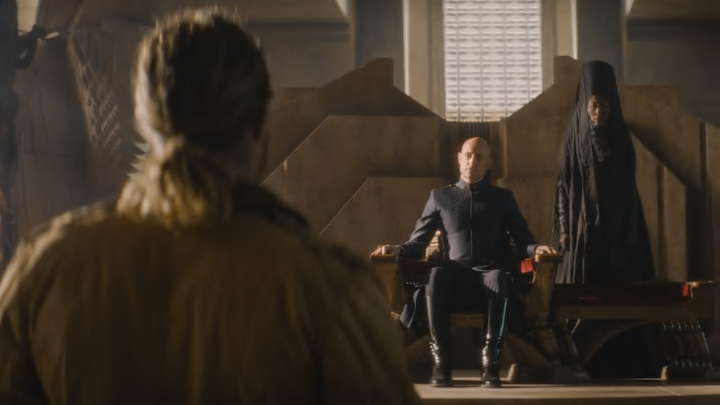This past Sunday, HBO aired the premiere episode of Dune: Prophecy, a new Dune prequel show set some 10,000 years before the birth of Paul Atreides, played by Timothée Chalamet in Denis Villeneuve's new Dune movies. The show introduces us to an emperor (Mark Strong) trying to hold onto his power as ambitious vassels try to move in. We meet members of the Bene Gesserit sisterhood, a shadowy group of women who advise the lords of these great houses while manipulating them for their own ends. Many viewers have taken this in and come to one conclusion: Dune: Prophecy is a lot like Game of Thrones.
I've seen this comparison made everywhere in the press. Esquire bemoans that it's not quite the "sci-fi Game of Thrones we hoped for." TheWrap feels the opposite, saying it's "like Game of Thrones in space." IndieWire says it "worms its way onto Game of Thrones turf." Looper says that show "wants to be Game of Thrones" while Rolling Stone thinks it "would simply love to be a sci-fi Game of Thrones." The Playlist says it "goes full-on Game of Thrones" and The Hollywood Reporter asks if it's "just House of the Dragon in space," adding a little variety.
I could go on, but you get the idea. At face value, I can see what they're talking about. Dune: Prophecy has a lot of bits about people trying to pull on the levers of power to affect the flow of events. Game of Thrones spent a lot of time on these topics too, as the heads of houses Lannister, Stark, Targaryen and more volleyed back and forth trying to get and keep a grip on the Iron Throne. You could think of the Bene Gesserit as a whole organization full of Littlefingers and Varyses, all trying to subtly massage events to their own advantage.

The truth is that Dune: Prophecy does share some things in common with Game of Thrones, despite there being differences everywhere, and not just the obvious fantasy vs sci-fi aesthetics. Dune: Prophecy is a good deal less sprawling than Game of Thrones, taking place almost exclusively on the Bene Gesserit home world of Wallach IX and the royal stronghold of Salusa Secundus. The supernatural elements are ramped up and the humor turned down. Dune: Prophecy makes fairly extensive use of flashbacks, which Game of Thrones did only on the rarest of occasions, etc.
But the bigger point is that even if these two shows have similarities, Game of Thrones did not invent the idea of constructing storylines around political gamesmanship in a fantasy/sci-fi setting. For that matter, neither did Dune, although it was doing it far earlier. Frank Herbert's original Dune novel was published in 1965. It tells the story of the noble-born Paul Atreides, whose house is undermined by the machinations of the vile Baron Harkonnen, who is working with the emperor to supplant Paul's father Duke Leto lest the duke gain too much support among the other great houses. To survive, Paul must make inroads with the Fremen people, who are kind of like wildlings who have learned to cope with extreme heat rather than extreme cold.
Books like Children of Dune put an even bigger focus on political machinations, as characters make plans within plans and moves within moves. This series has always been preoccupied with the nature of power, as are a lot of fantasy and sci-fi series. Dune: Prophecy faithfully translates this in a way that feels like Dune. Especially as the series continues, we'll see the layers of schemes unfold in a more careful way than they ever did on Game of Thrones, which was more interested in how human error and ego can upend our best laid plans. The somber tone of Dune: Prophecy also feels true to the source, whereas Game of Thrones took more time out for levity.
So while I see where people are coming from when they compare these two series, I vote we retire treating the one as if it's an imitation of the former. Dune: Prophecy has enough to offer on its own.
To stay up to date on everything fantasy, science fiction, and WiC, follow our all-encompassing Facebook page and Twitter account, sign up for our exclusive newsletter and check out our YouTube channel.
